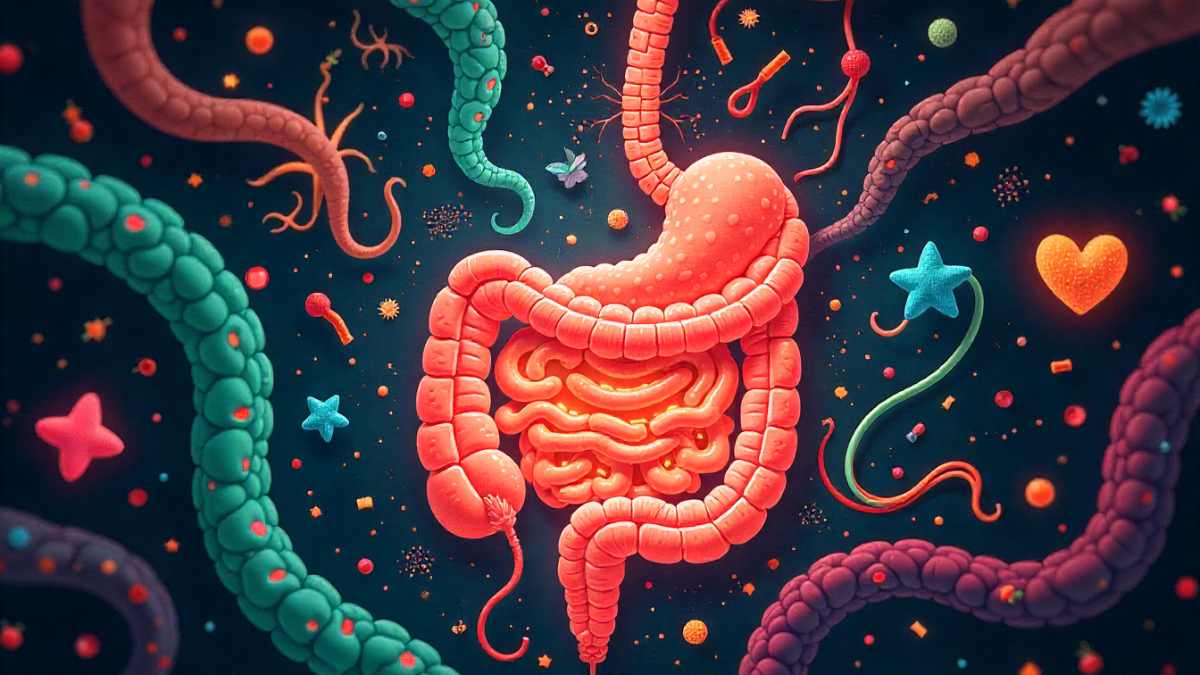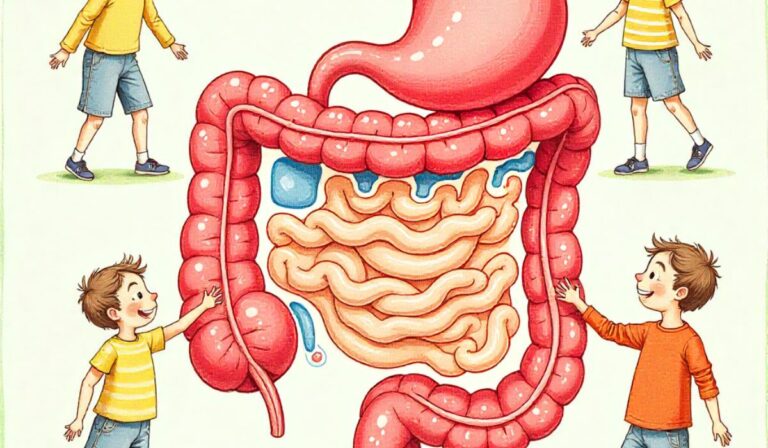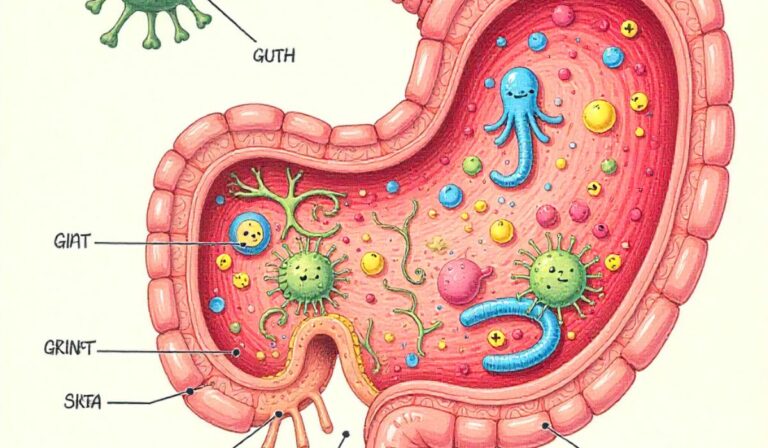From #GutTok to Science: Separating Gut Health Trends from Hype
Have you ever scrolled through your social media feed and felt bombarded by the latest health fads? Maybe you’ve seen influencers promoting gut health fixes, promising quick results and miracle cures.
The abundance of information can be overwhelming, making it tough to distinguish between credible advice and trendy misinformation.
This blog post will help you separate the science-backed facts from the #GutTok hype, empowering you to make informed decisions about your gut health. You’ll gain a clear view of what’s effective and what’s not, improving your wellbeing.
Key Takeaways
- Learn how to identify reliable information about gut health.
- Explore the science behind popular gut health trends.
- Understand the role of the gut microbiome in overall health.
- Discover evidence-based strategies for improving your gut health.
- Identify common myths and misconceptions about gut health.
- Get answers to frequently asked questions about gut health practices.

Decoding the Gut: Understanding Your Digestive System
Your digestive system, often referred to as your gut, is more than just a place where food goes to disappear. It’s a complex ecosystem, crucial for overall wellbeing.
It plays a role in everything from nutrient absorption to immune function. Understanding how your digestive system functions is the first step toward taking care of it.
This knowledge gives you the background to explore different gut health approaches, helping you sort through the noise and figure out what may work for you.
The Anatomy of the Gut
The gut is a long, winding tube, starting at your mouth and ending at your anus. It’s made up of several parts, each with a unique role in digestion.
From the initial breakdown in the mouth to the final absorption of nutrients in the small intestine and waste removal in the large intestine, each organ works as part of a system.
Knowing the names and roles of these organs helps you understand where issues can originate and how different factors affect the process.
- Mouth and Esophagus: Digestion begins in the mouth, where food is chewed and mixed with saliva. The esophagus then carries the food to the stomach.
- Stomach: The stomach mixes food with digestive juices, breaking it down further.
- Small Intestine: This is where most nutrient absorption occurs. The small intestine is very long.
- Large Intestine (Colon): The large intestine absorbs water and forms waste.
- Anus: This is where waste exits the body.
The gut’s walls are lined with a layer of cells that are constantly renewing, and are sensitive to foods and other things. Proper care of the gut lining is important to your health.
The Gut Microbiome: A World Within
The gut microbiome is like a bustling city within your gut. It’s made up of trillions of bacteria, fungi, viruses, and other microorganisms.
These tiny residents, collectively called the gut microbiota, influence nearly every facet of your health. Some microbes are beneficial, others less so, and they all interact with each other. The balance within this ecosystem is key to gut health.
- Diversity is key: A diverse microbiome, with many different types of microbes, is generally healthier than a less diverse one.
- Probiotics: These are live bacteria that can benefit your gut health. Think of them as reinforcements for your gut’s friendly inhabitants.
- Prebiotics: These are foods that feed the good bacteria in your gut. They act as fuel for a healthy microbiome.
- Microbiome Imbalance: A gut microbiome imbalance (dysbiosis) can play a part in health problems.
A study by the National Institutes of Health indicated that the gut microbiome is linked to a broad range of health conditions.
The interplay between your gut and overall wellness highlights the importance of a balanced gut ecosystem.
From #GutTok Trends to Scientific Evidence: Separating Fact From Fiction
Social media is full of gut health trends. Separating the legitimate from the hype requires a good eye for science-backed studies. Let’s explore a few popular trends and look at the evidence that supports them.
The Low FODMAP Diet: Is It Right for You?
The Low FODMAP diet is a dietary approach used to manage symptoms of Irritable Bowel Syndrome (IBS). It involves limiting foods high in FODMAPs.
FODMAPs are certain types of carbohydrates that can be poorly absorbed in the small intestine, leading to gas, bloating, and other digestive issues. Many people report improvements in their symptoms when following this diet, but it’s often a temporary plan.
- What are FODMAPs? FODMAP stands for Fermentable Oligosaccharides, Disaccharides, Monosaccharides, and Polyols. They are found in various foods, from fruits and vegetables to dairy products and wheat.
- How it works: By limiting FODMAPs, you decrease the amount of undigested carbohydrates reaching the large intestine. This can reduce gas production and other symptoms.
- Who benefits? While effective for IBS symptom relief, it’s not a long-term solution for everyone. It’s often used under the guidance of a healthcare professional.
- Foods to Avoid: Common high-FODMAP foods include apples, onions, garlic, dairy products, and certain grains.
- Reintroduction: The Low FODMAP diet is usually done in phases.
A study published in the Gastroenterology journal highlights the diet’s effectiveness for individuals with IBS, reporting significant symptom improvement. However, it’s recommended that it be done under the guidance of a doctor.
Probiotics and Supplements: Are They Truly Helpful?
Probiotics, which are live bacteria, are frequently touted as a cure-all for various health conditions. While beneficial bacteria are indeed helpful for your gut, understanding what probiotics are and when they are helpful is very important.
Not all probiotics are the same, and the best ones can vary from person to person, depending on their microbiome.
- Types of Probiotics: Common probiotic strains include Lactobacillus and Bifidobacterium.
- Benefits: Probiotics can help with IBS, antibiotic-associated diarrhea, and possibly other conditions.
- Choosing Probiotics: Look for products that list the specific strains and dosages.
- Prebiotics vs. Probiotics: Prebiotics feed probiotics, and support the growth of beneficial bacteria in your gut.
- Supplements: Besides probiotics, there are various supplements promoted.
According to the National Center for Complementary and Integrative Health, many studies have explored the use of probiotics.
The research indicates that probiotics can be helpful for some digestive issues, though more research is needed for specific conditions. It’s recommended to look for supplements that have been tested by third parties.
The Importance of Fiber for Gut Health
Fiber is an often-overlooked nutrient that’s crucial for gut health. It is not digested by your body, but it plays an important role in keeping your digestive system moving.
Fiber feeds your gut bacteria, which helps promote a balanced microbiome. Different types of fiber serve different purposes.
- Types of Fiber: There are two main types: soluble and insoluble fiber.
- Soluble Fiber: Dissolves in water and forms a gel in the gut.
- Insoluble Fiber: Does not dissolve in water and adds bulk to the stool.
- Benefits of Fiber: Fiber helps prevent constipation, promotes regularity, and feeds your gut bacteria.
- Food Sources: Good sources of fiber include fruits, vegetables, whole grains, and legumes.
The Dietary Guidelines for Americans recommend that adults should consume 25-30 grams of fiber daily, though many people don’t meet this recommendation. A diet rich in fiber promotes a healthy gut.
Gut Health for All: Practical Steps for a Happy Gut
Improving your gut health is possible, but requires a comprehensive approach. It involves more than just taking a supplement. Here are the key elements of a gut-friendly lifestyle.
Dietary Strategies for a Healthy Gut
The food you eat has a huge impact on your gut health. Choosing a diet focused on whole, unprocessed foods is one of the best things you can do for your gut.
This means prioritizing fruits, vegetables, whole grains, and lean proteins. These foods provide essential nutrients and fiber to support a healthy microbiome.
- Focus on whole foods: Build your diet around fruits, vegetables, whole grains, lean protein, and healthy fats.
- Include fiber-rich foods: Aim for a variety of fiber sources to nourish your gut bacteria.
- Limit processed foods: Processed foods often contain added sugars, unhealthy fats, and additives that can disrupt gut health.
- Consider fermented foods: Foods like yogurt, kefir, sauerkraut, and kimchi are good sources of probiotics.
- Stay hydrated: Drinking enough water helps with digestion and promotes regularity.
A review published in the American Journal of Clinical Nutrition suggests that diets high in plant-based foods are associated with a more diverse and healthier gut microbiome. It shows that simple dietary adjustments can produce significant results.
Lifestyle Factors That Impact Gut Health
Besides diet, other parts of your lifestyle can also affect your gut health. Things like sleep, stress management, and exercise play important roles in maintaining a healthy digestive system.
Making time for regular exercise, managing stress, and getting enough sleep all help to support a balanced gut microbiome.
- Manage stress: Chronic stress can negatively impact gut health. Find healthy ways to manage stress, such as meditation, yoga, or spending time in nature.
- Get enough sleep: Sleep deprivation can disrupt the gut microbiome. Aim for 7-9 hours of quality sleep each night.
- Exercise regularly: Physical activity can promote gut motility and increase microbial diversity.
- Limit alcohol and smoking: Alcohol and smoking can damage the gut lining and disrupt the microbiome.
- Practice mindful eating: Eat slowly, pay attention to your body’s hunger and fullness cues, and chew your food well.
Studies have linked stress and sleep disruption to changes in the gut microbiome. For example, research shows that individuals with chronic stress often have reduced microbial diversity. Incorporating lifestyle changes is important to improving your gut health.
When to Seek Expert Advice
While lifestyle and dietary changes are often effective for improving gut health, it’s important to know when to seek help from a healthcare professional. If you experience persistent symptoms or concerns, talking to a doctor is the right thing to do.
- Persistent symptoms: If you experience frequent bloating, gas, abdominal pain, diarrhea, or constipation, talk to your doctor.
- Changes in bowel habits: Any significant changes in your bowel habits, such as blood in your stool, should be evaluated by a professional.
- Unexplained weight loss: If you’re losing weight without trying, or if you’re experiencing a loss of appetite, this could be a sign of a more serious condition.
- Suspected food sensitivities: If you suspect that certain foods are causing symptoms, an evaluation could rule out any medical conditions.
- When in doubt: If you have concerns about your gut health, talk to your doctor. They can help diagnose any underlying conditions and suggest appropriate treatments.
Medical specialists like gastroenterologists and registered dietitians can offer testing to determine what’s happening in the gut. Talking to a doctor helps you get the most appropriate information.
Common Myths Debunked
Many myths surround gut health. Separating the real information from the fiction can be tricky. Here’s the truth behind some common misconceptions:
Myth 1: You Can “Cleanse” Your Gut
Many trends promote “detox” programs. These typically involve special drinks, pills, or fasting. However, your body naturally detoxifies itself through the liver, kidneys, and digestive system. There’s no scientific evidence to support the idea that these cleanses are effective or necessary.
Myth 2: All Probiotics are the Same
It’s easy to believe all probiotics are the same. But, different strains of probiotics provide different benefits.
Choosing the right probiotic depends on your specific needs and health concerns. It’s important to research the strains and look for products that have been studied.
Myth 3: Gluten is Always Bad for Everyone
Gluten is a protein found in wheat, barley, and rye. While it can be a problem for people with celiac disease or gluten sensitivity, it is perfectly safe for most people to eat. Unless you have a diagnosed condition, there’s no need to avoid gluten.
Myth 4: You Don’t Need to See a Doctor for Digestive Issues
It can be tempting to self-treat gut problems. But, persistent symptoms, like abdominal pain or irregular bowel movements, should be checked out by a doctor. Ignoring symptoms can lead to bigger problems. A doctor can perform tests and provide an accurate diagnosis.
Myth 5: Fermented Foods Alone are Enough for Gut Health
Fermented foods, such as yogurt, sauerkraut, and kimchi, contain probiotics. However, it’s important to get a diverse range of nutrients. Just eating fermented foods won’t guarantee optimal gut health. A balanced diet, rich in fiber, is critical.
FAQ Of From #GutTok to Science
What are the most common symptoms of poor gut health?
A: Common symptoms include bloating, gas, abdominal pain, diarrhea, constipation, and acid reflux. Also, fatigue, skin problems, and changes in mood can be related to gut health. If you experience any of these symptoms frequently, you should consult with a doctor.
How can I improve my gut health naturally?
A: Incorporate a fiber-rich diet, which includes fruits, vegetables, and whole grains. Stay hydrated, exercise regularly, manage stress, and get enough sleep. Also, consider adding fermented foods or probiotic supplements, and limit processed foods and sugar.
Are all probiotics safe?
A: Generally, probiotics are considered safe for most people. However, some individuals might experience mild side effects, such as gas or bloating, when they first start taking them. It’s important to choose products from reputable brands that list the specific strains and dosages.
What foods are good for gut health?
A: Great foods for gut health include a variety of fruits, vegetables, whole grains, legumes, and fermented foods. Some specific examples are berries, leafy greens, oats, lentils, yogurt, kefir, sauerkraut, and kimchi. These foods provide nutrients that support a balanced microbiome.
How long does it take to see results from improving gut health?
A: It can take anywhere from a few weeks to several months to see changes. It depends on the person and the changes they make to their diet and lifestyle. Consistency is important, so stick to your plan.
Final Thoughts
The information on gut health can be confusing, but you can use a science-based strategy. By learning about the digestive system, knowing the evidence behind different trends, and focusing on a balanced approach, you can start to make positive changes.
Prioritize a fiber-rich diet, manage stress, get adequate sleep, and stay hydrated. This can have a noticeable effect on your wellbeing.
Remember to consult with healthcare professionals when needed. Taking care of your gut can enhance your overall health.



![Engineered Synbiotics Gut Intervention for Health Enhancement[1]](https://mycleanseplan.com/wp-content/uploads/2025/10/Engineered_Synbiotics__Gut_Intervention_for_Health_Enhancement1-768x448.jpg)
![Gut & Skin Link Exploring the Microbiome's Role in Skin Health[1]](https://mycleanseplan.com/wp-content/uploads/2025/11/Gut__Skin_Link__Exploring_the_Microbiomes_Role_in_Skin_Health1-768x448.jpg)

![Microbial Signature Index Unveiling Disease Prediction Capabilities[1]](https://mycleanseplan.com/wp-content/uploads/2025/10/Microbial_Signature_Index__Unveiling_Disease_Prediction_Capabilities1-768x448.jpg)